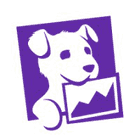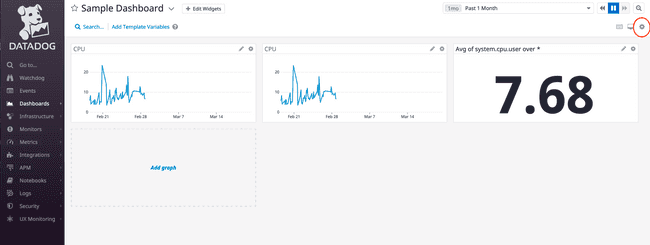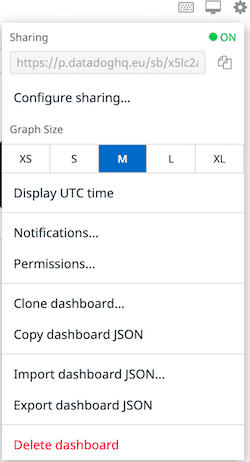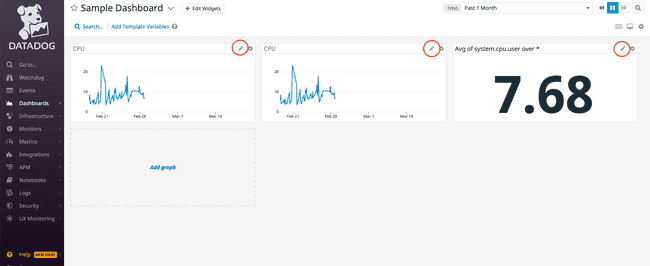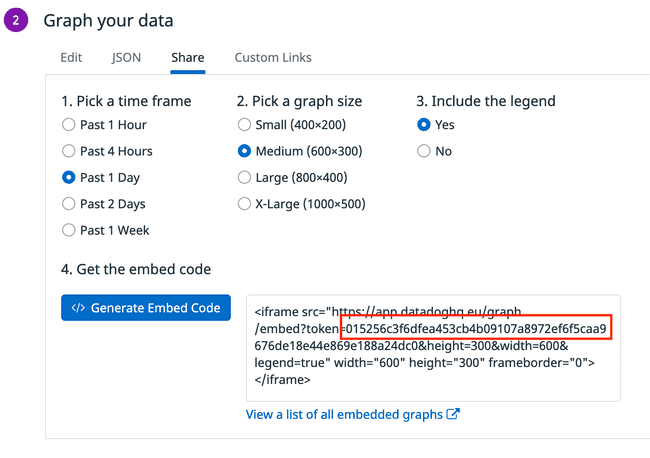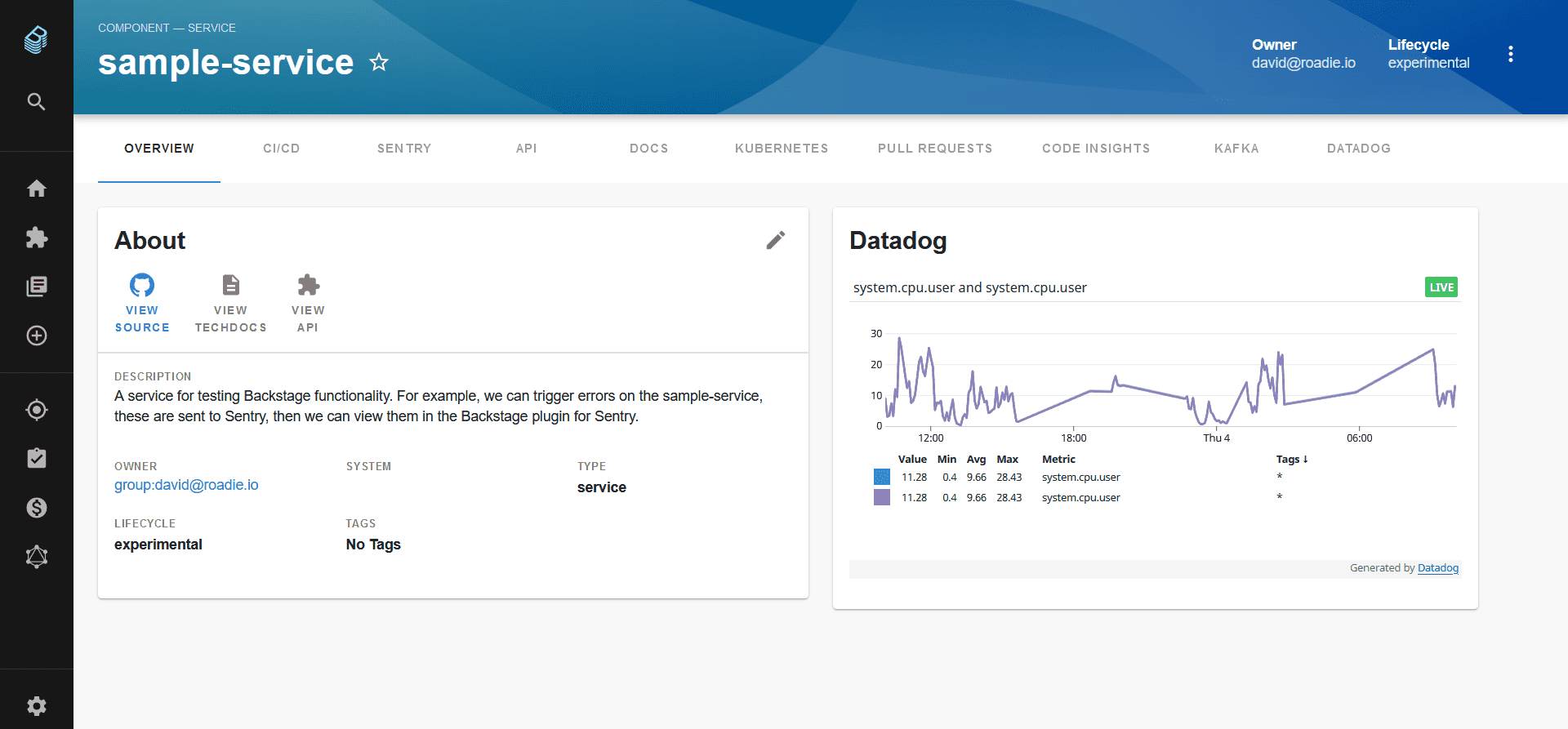
See the Datadog Backstage plugin in action
Installation steps
With this plugin, you can embed Datadog graphs and dashboards into your instance of Backstage. Datadog is a monitoring service for cloud-scale applications, providing monitoring of servers, databases, tools, and services through a SaaS-based data analytics platform.
Install the Datadog plugin into Backstage.
cd packages/app
yarn add @roadiehq/backstage-plugin-datadogAdd Datadog widget to your Overview tab.
// packages/app/src/plugins.ts
const overviewContent = (
// ...
<Grid container spacing={3} alignItems="stretch">
<EntitySwitch>
<EntitySwitch.Case if={isDatadogGraphAvailable}>
<Grid item>
<EntityDatadogGraphCard/>
</Grid>
</EntitySwitch.Case>
</EntitySwitch>
</Grid>
);Add a Datadog card to the overview tab of the EntityPage.tsx source file
// packages/app/src/components/catalog/EntityPage.tsx
import {
EntityDatadogContent,
EntityDatadogGraphCard,
isDatadogGraphAvailable
} from '@roadiehq/backstage-plugin-datadog';
const serviceEntityPage = (
// ...
<EntityPageLayout>
<EntityLayout.Route path="/datadog" title="Datadog">
<EntityDatadogContent />
</EntityLayout.Route>
</EntityPageLayout>
)Found a mistake? Update these instructions.
Things to know
Specify datadog domain
Datadog embedded graph is using datadoghq.eu as default top-level domain, when other is not specified. If you are using other domain, you must specify it with corresponding annotations datadoghq.com/site.
Adding the annotations and the values from Datadog to your component’s metadata file.
apiVersion: backstage.io/v1alpha1
kind: Component
metadata:
name: sample-service
description: |
A sample service
annotations:
datadoghq.com/site: datadoghq.comHow to embed a datadog dashboard in Backstage
Obtain the dashboard URL from Datadog that you will need for your metadata.
- Login to your Datadog account.
Get the dashboard URL.
-
Navigate to the dashboards list by hovering over dashboards on the page’s left-hand side and selecting the dashboard list.
-
Select a dashboard from this list.
-
Within the dashboard you have chosen, click the settings cog on the screen’s right-hand side, circled in red.
-
Copy the URL from the Sharing textbox.
-
This URL is the value you need for the
datadoghq.com/dashboard-urlannotation.
Adding the annotations and the values from Datadog to your component’s metadata file.
apiVersion: backstage.io/v1alpha1
kind: Component
metadata:
name: sample-service
description: |
A sample service
annotations:
datadoghq.com/dashboard-url: <<DATADOGURL>>How to embed a datadog graph in Backstage
- Login to your Datadog account.
Get the graph token.
- Click on the graph pencil, circled in red, from your dashboard.
-
Click on the Share tab, choose a timeframe, graph size and legend. Click generate the embedded code.
-
Copy the token value that is highlighted in the red square.
-
this token is the value you need for the
datadoghq.com/graph-tokenannotation
Customize graph size.
In order to customize size of the graph you may specify datadoghq.com/graph-size annotations and specify one of the following options:
-
‘small’
-
‘medium’
-
‘large’
-
‘x-large’;
If not specified, your graph will be ‘medium’ size per default.
Adding the annotations and the values from Datadog to your component’s metadata file.
apiVersion: backstage.io/v1alpha1
kind: Component
metadata:
name: sample-service
description: |
A sample service
annotations:
datadoghq.com/graph-token: <<TOKEN>Set frame-src in Content Security Policy
// app-config.yaml
backend:
csp:
frame-src:
# Allow your Datadog URL for @roadiehq/backstage-plugin-datadog
- 'DATADOG_SOURCE'
- 'DATADOG_DASHBOARD_SOURCE'Security
Sharing Datadog dashboards and graphs makes them public on the internet and accessible by anyone with the URL.
Make sure you do not share these URLs with untrusted actors.
Prefer a no-code Backstage setup?
Become a Backstage expert
To get the latest news, deep dives into Backstage features, and a roundup of recent open-source action, sign up for Roadie's Backstage Weekly. See recent editions.
